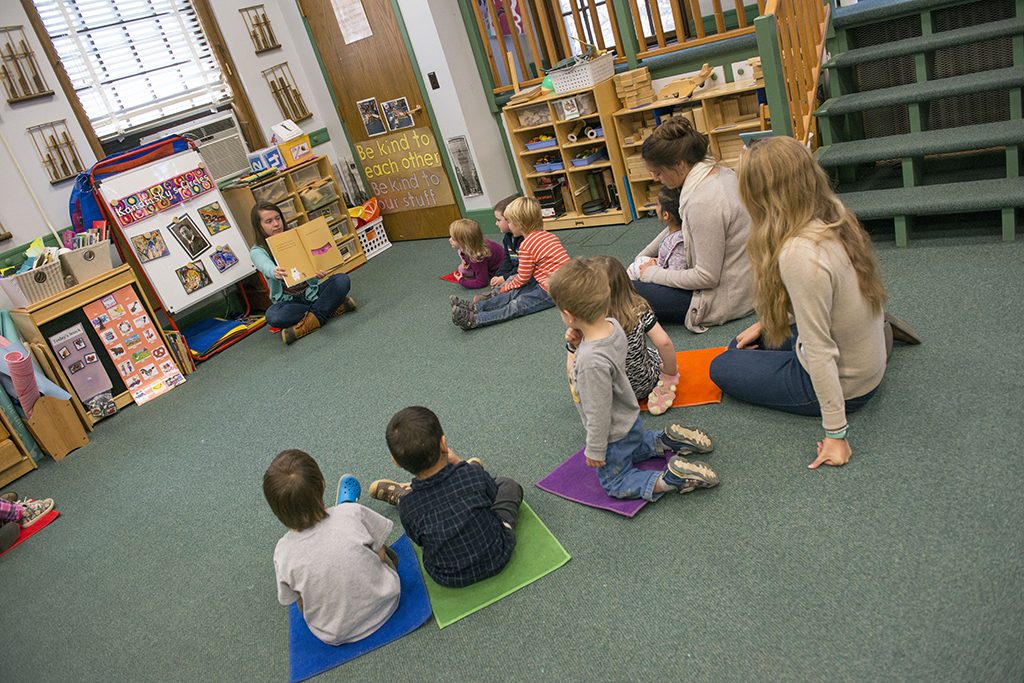UMaine child development learning center reaccredited by national association

The Katherine Miles Durst Child Development Learning Center at the University of Maine recently earned reaccreditation from the National Association for the Education of Young Children—the nation’s leading organization of early childhood professionals.
“It means we’re the best of the best,” says center coordinator Margo Brown. “It’s just recognition for what we do every day for the children in our program, and for the students on campus, who get to see firsthand what a quality learning environment looks like for young children.”
To earn accreditation, the program and its services were judged according to 10 NAEYC Early Childhood Program Standards, earning scores of 100 percent or more on each. The scores higher than 100 percent reflect the fact that the learning center meets emerging criteria in those areas, essentially going above and beyond what is required. In addition, there was an on-site visit by an NAEYC assessor in late September. The center will be subject to additional unannounced site visits during its accreditation, and must file annual documentation to stay in compliance.
Brown first guided the learning center through the rigorous national accreditation process five years ago, and says putting together the paperwork that time took her three years. For reaccreditation, it only took about a year.
“I already had all my ducks in a row. I just have different teachers now, different children, and they re-do the criteria every so often, and then I have to go through and look at that and make sure I have everything right,” Brown says.
The Katherine M. Durst Child Development Learning Center was established in 1931. It is used as a teaching tool for students focusing on early childhood education as part of the College of Education and Human Development’s undergraduate major in child development and family relations. Brown estimates that over the years more than 8,000 college students have been involved in the center, and that more than 4,000 young children have passed through its doors.
In written comments, the NAEYC assessor commended the center for among other things, “using developmentally, culturally and linguistically appropriate and effective teaching approaches that enhance each child’s learning and development.”
The Katherine M. Durst center operates Monday through Thursday, and currently has 35 children enrolled across three groups. The morning groups are made up of three- and four-year-olds, some who come every day, and others who come every other day. The afternoon group is a pre-kindergarten program. The families who utilize the center run the gamut from UMaine students and employees, to residents of Orono and surrounding communities. Brown says some of the children have special needs, while others are English Language Learners. She says the teachers emphasize development of the whole child, with an emphasis on play and social literacy.
“We talk about community, and how we’re kind to each other, how to be a friend, how to have a friend. We teach them problem solving, conflict resolution, and then we build other skills into that,” says Brown.
While Brown is the only full-time employee, the center also has two head teachers—graduate students who oversee the program, either in the morning or the afternoon. There are several assistant teachers, who must be enrolled in the Early Childhood Education Field Placement class, CHF 422. They do some curriculum planning, and are responsible for running the classroom, as well as working with families. Before they can take the field placement class, students must first take the Practicum in Early Childhood Programs class, CHF 203, where they observe other students working with children. The center also welcomes nursing students to do observations on children, music education majors to teach music lessons, as well as graduate students doing research where they need access to young children.
Olivia White started out taking the early childhood practicum, then took the field placement class, and now is one of the head teachers at the Katherine M. Durst center. She calls working at a nationally accredited preschool “an unreal opportunity” for her as a master’s student studying special education.
“I would not be the teacher I am today without this place, hands down,” White says. “I was never that kid that did acting. I was never into dressing up. But I’ve put on plays for my students. We’ve gone to the theater, done field trips. Margo pushes us out of our comfort zone every day, in a good way.”
White says the reaccreditation process was kind of nerve-racking, especially when the NAEYC assessor interviewed her. But she ultimately says it was worth it, because it will be an experience she can tell potential future employers about.
“Not many people at the age of 22 years old can put that on their resume, can say that they’re a head teacher at a nationally accredited preschool,” she says.
The NAEYC accreditation program is 25 years old. More than 7,000 preschool programs nationwide are accredited through the organization, including 47 in Maine.
Contact: Casey Kelly, 207.581.3751
